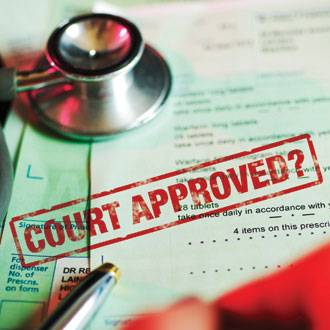
GPs have been caught up in a legal dispute over a drug patent that is threatening the fundamental principles of prescribing in general practice.
A directive from the High Court has led to GPs being advised they must prescribe a branded version of pregabalin, known in the UK as Lyrica, when the drug is being used to treat neuropathic pain.
And experts are warning that the judgment is not just a one-off and that GPs could face further restrictions on their freedom to prescribe according to patients’ clinical need, as a result of similar legal judgments in the future.
Legal threat
The current threat has come from an attempt by pharmaceuticals giant Pfizer to enforce a so-called ‘second medical use’ patent on the drug pregabalin, after it claimed it still had marketing rights for the drug for neuropathic pain.
Following an interim court order before a full court hearing in July, NHS managers have told GPs to prescribe the brand Lyrica by name when prescribing for neuropathic pain. GPs immediately expressed outrage, with many denouncing the ruling as ‘immoral’, saying it contravened a ‘fundamental principle’ of general practice – that GPs prescribe based on clinical judgment.
‘I initially refused to comply but felt I had to after the GPC’s advice’
Dr Steven Haigh
But it looks as though such erosions of this principle could become more common.
Experts are warning that more drugs are likely to be subject to the same type of claim Pfizer has launched for pregabalin.
They point to a greater focus on repurposing of existing medicines, with the advent of newer ‘biological’ agents in particular leading to surprising new indications.
Pfizer itself believes there will undoubtedly be further instances. A spokesperson tells Pulse: ‘Through the Lyrica example, Pfizer and the NHS have collaborated to set an important precedent in a situation that is likely to become more common as our understanding of medical conditions and science evolves.’
Common scenario
Experts in patent law agree there is a likelihood of similar suits impacting on GPs in future.
Graham Burnett-Hall, a solicitor who advises on intellectual property at Marks & Clerk, says this ‘will certainly come up again’, while Rowan Freeland, another lawyer specialising in patent law, from Simmons & Simmons agrees: ‘I think you could see this happening once every two years.’
Alexandra Pygall, intellectual property partner at law firm Stephenson Harwood, says the advent of newer types of molecules with unexpected actions means it is increasingly likely that researchers will find entirely new therapeutic uses for known substances or compositions.
What will happen if I don’t follow this guidance?
- NHS England’s guidance tells GPs that when prescribing pregabalin for neuropathic pain, they must prescribe the branded version, Lyrica. But it is unclear what (if any) implications there are for GPs who ignore this advice.
- Pharmacists have been told to ask GPs to re-prescribe Lyrica when prescribing pregabalin for neuropathic pain in a template letter from the Pharmaceutical Services Negotiating Committee, which has been endorsed by NHS England. The letter also mentions the possibility of Pfizer taking legal action – but does not specify against whom.
- The Medical Defence Union has said GPs must be ‘mindful of their GMS/PMS contractual obligations, which state they must have “regard” for relevant guidance issued’. It adds that GPs should be able to ‘justify’ their position if they do not comply.
- The GPC has said it would ‘advise doctors to prescribe Lyrica by brand when used for its pain control indication for the time being’ – although it has said that it is those supplying generic pregabalin, rather than prescribing it, that are likely to be open to litigation.
- One local pharmacy chain flagged up prescriptions of generic pregabalin as a ‘significant event’, notifying NHS England, but stopped when the local area team said this was not necessary.
A glance at health coverage in the news reinforces this view. In one week in April, there were national headlines on how the diabetes drug liraglutide is being trialled for prevention of dementia in humans, an existing cancer drug is proving effective in Alzheimer’s disease and the ‘athlete’s foot drug’ miconazole is being touted as a potential future ‘cure’ for multiple sclerosis.
Ms Pygall explains: ‘For example, if a drug for cancer is found to be effective against Alzheimer’s you could see how a second medical use patent might come about, because it’s not an obvious development.’
This is not good news for GPs, but there remains confusion over the consequences for GPs who ignore guidance on second patents.
In the case of pregabalin, the Medical Defence Union has said NHS England could potentially use the GP contract to enforce their guidance.
![]()
After taking legal advice, the GPC has told GPs they should go along with the guidelines. As a result, even GPs who initially resisted the ruling have fallen in line.
Dr Steven Haigh, a GP in West Calder and a Lothian LMC member, explains: ‘I started off refusing to do it, but further to all the correspondence we have had, I felt I had to comply.’
He adds: ‘The only advice we have received from the GPC left us with no choice but to change the prescriptions.’
But, for many GPs, the diktat is a fundamental threat to their professional integrity and smacks of the Department of Health bowing down to ‘Big Pharma’.
Even in the few examples when GPs are asked to prescribe drugs by brand – such as anti-epileptics, because of variations in the bioavailability between drug formulations – the final decision is down to GPs’ clinical judgment.
But, as Dr Haigh explains, this ruling ‘is asking us to change a prescription for a non-clinical reason to a more expensive form of the same drug, that is going to do the same job at much greater cost’.
Dr Andrew Mimnagh, GP and vice-chair of NHS Sefton CCG, believes NHS England’s intervention was ‘unnecessary’, with the court having ruled ‘reasonable accommodation’ was allowed.
But, Dr Mimnagh says, in issuing guidance, managers have overlooked one of the fundamental principles of medical practice which is that ‘you can use whatever you want as a doctor for whatever indication you want, even if it is not licensed’.
It is not just the principle that is at stake. Dr Haigh laments the addition of yet another piece of unfunded work.
He says: ‘Everybody always says “it’s not much work”– writing an extra letter here, just spending a few extra minutes there. But you have to remember that general practice is covering the whole spectrum of medicine and much social care as well.
‘We are endlessly being asked to do extra tasks that supposedly won’t take long but we have reached the point where we don’t have the capacity to do that any more.’
How pregabalin prescribing became an issue for GPs
July 2014
Original product patent for pregabalin (Lyrica) relating to epilepsy and generalised anxiety disorder expires – meaning generics companies can launch another version of the drug. However, Warner-Lambert, a subsidiary of Pfizer, also holds a ‘second medical use’ patent relating to a third indication – neuropathic pain – which does not expire until 2017.
September 2014
Pfizer starts discussions with NHS England and other stakeholders about developing guidance for prescribers and pharmacists on the ‘second patent’, after manufacturer Actavis confirms it is preparing launch of generic pregabalin.
December 2014
Pfizer seeks temporary injunction against Actavis and other generic manufacturers and writes to CCGs warning that it intends to contest infringements of the patent and they must issue guidance to prescribers.
January 2015
Pfizer fails in bid to take out temporary injunction against Actavis and others – but judge rules ‘the best solution to the problem’ is to ‘try to ensure that prescribing doctors prescribe pregabalin for the treatment of pain by reference to the brand name Lyrica’.
February 2015
High Court interim judgment orders NHS England and equivalent bodies to issue guidelines to GPs and pharmacists stating ‘pregabalin should only be prescribed for the treatment of neuropathic pain under the brand name Lyrica’.
Early March 2015
NHS England releases guidance telling GPs they should only prescribe Lyrica when newly prescribing pregabalin for neuropathic pain, while repeat prescriptions should be changed ‘as soon as possible’.
Mid-March 2015
NHS managers forced to intervene after a pharmacy chain started alerting the local area team to a ‘significant event’ whenever GPs prescribed generic pregabalin.
July 2015
Full court case on the use of the patent to take place.
Pulse October survey
Take our July 2025 survey to potentially win £1.000 worth of tokens














